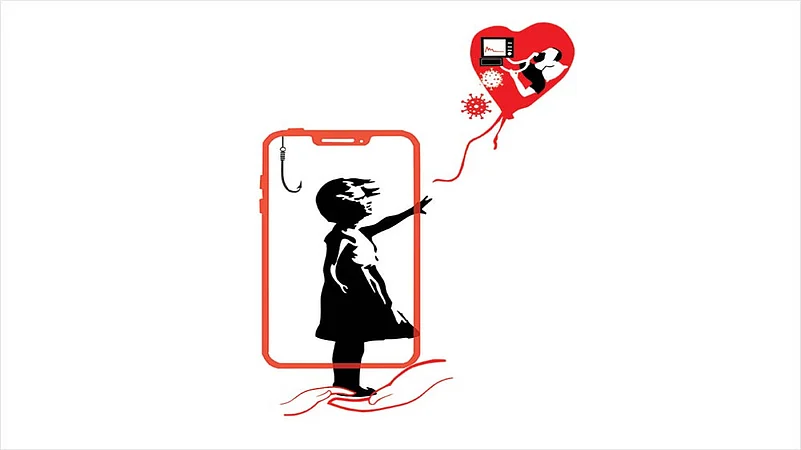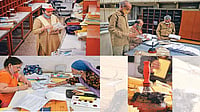It won’t be easy for Sneha, 8, and Neha, 10, to forget the Covid pandemic that took away their parents. They are staying with their maternal aunt, who says Sneha is adapting to the situation, but Neha is finding it difficult. Whenever Sneha asks about her parents, she is told that they have gone to be with God for a few days. Neha, however, understands that their parents won’t come back. “We won’t give them up for adoption. They are my responsibility and that is what family is for,” says the aunt. After eight years, Neha will be an adult and can then decide for herself and her sister. In a Punjab village, 16-year-old Rohanpreet lost his parents in April, when he was to appear for his board exams. “Elders in the village have decided to take care of him until he is 18 years old,” says a neighbour. “His father has left behind much property, and we are not sure whether their distant relatives wouldn’t misuse it for personal gain. Neighbours take turns to look after such kids and all villagers will pool in money, if necessary, to meet the child’s needs.”
As the pandemic ravages India, heart-breaking stories of orphaned children have emerged, many of them highlighted on social media. The Centre has said that at least 577 children have lost both their parents in the second wave of the pandemic. But along with the distressing stories have also emerged the disturbing news of adoption rackets popping up, ostensibbly to prey on gullible people.
ALSO READ:The Wandering Needle
Union women and child development minister Smriti Irani tweeted saying adoption of such kids through middlemen, WhatsApp messages etc is illegal and due process must be followed. In Uttarakhand, at the time of hospital admission, it is mandatory for Covid patients to declare the details of their children and the person they should be handed over to in case both parents die.

In a letter to state chief secretaries in the first week of May, the National Commission for Protection of Child Rights (NCPCR) stated that the Juvenile Justice (Care and Protection of Children) Act, 2015, “provides for the procedure to be followed for children who have lost their family support, and have become child in need of care and protection”. The directive said that such children must be produced before the district-level child protection authority. The NCPCR, however, has no data on the number of ‘Covid orphans’.
ALSO READ: In Small Doses
“Several NGOs are minting money in the name of Covid orphans and people need to be alerted about it,” says a senior government official, who didn’t wish to be identified. “If anyone comes across such a case, please report it to helpline no. 1098 or the nearest police station.” He cites a recent case from Noida where an NGO was seeking funds in the name of Covid orphans. “Covid orphans can fall prey to child traffickers, organ traffickers and sex rackets. People need to understand that it is important to bring the kids into the system in order to save them. Adding the names of children to the orphan registry protects their rights too.”
According to the Child Adoption Resource, Information and Guidance System, a portal of the WCD ministry’s Central Adoption Resource Authority, 2,253 children are legally available for adoption as of March 2021. They include 169 healthy children below age of 2 years, 570 healthy children above the age of 2 years, 178 children who are sibling sets and 1,336 children with special needs. Most of the children are from Madhya Pradesh, Andhra Pradesh and Odisha.
Meanwhile, the Punjab government has promised Rs 1,500 per month to Covid orphans as social security pension and free education up to graduation. CM Amarinder Singh said it is the State’s duty to become the foster parent of such children. The Uttarakhand government has announced the Chief Minister Vatsalya Yojana in which Covid orphans will be given Rs 3,000 per month and provided with education and training until the age of 21 years, besides a 5 per cent quota in government jobs. District magistrates will be responsible for ensuring that their property is not sold. Uttar Pradesh CM Yogi Adityanath has announced that the state government will take care of all children who lost their parents to Covid’s second wave. The UP government has identified 60 such children so far. The Madhya Pradesh government has announced monthly pension for Covid orphans along with free education and ration, while Andhra Pradesh CM Y.S. Jaganmohan Reddy has announced a fixed deposit of Rs 10 lakh for them. Other state governments are mulling over similar schemes.
As the beneficiaries are minors, they will likely remain in government custody until they become adults, with the government deciding how to spend the money allotted to them. With orphanages and child-care centres in India in a deplorable condition, as several reports testify, incorporating Covid orphans in the adoption system as soon as possible could be a better alternative, where they get a family and a home environment for better healing.
“We are failing to protect the most vulnerable children in India,” says Meera Marthi, an adoption counsellor and co-founder of the non-profit WAIC. “Of the 25-30 million abandoned and orphaned children, only 0.25-0.5 million reach childcare institutions or shelters. And only 2,000 reach the adoption pool.” Along with WAIC’s two co-founders, Smriti Gupta and Protima Sharma, Meera is running ‘Safe Surrender’ campaign to spread awareness about legally surrendering children to specialised adoption agencies instead of abandoning them or leaving them in shelters or orphanages.
Meera says technology should be used as an aid to ensure eligible children in child-care institutions come into the legal adoption pool and find a new family. “Several institutions continue housing children who are eligible to go into the legal adoption pool because they either do not have the mindset for adoption or are not aware of the process. There also institutions that house children without registering under the JJ Act, which makes it harder to monitor them,” she adds.
***
How to Adopt a Child
It takes around 1.5-2 years to adopt a child in India
- If you want to adopt a child, you first register with a placement agency or special adoption agency.
- Within three months, a social worker visits your home to understand your strengths and weaknesses as parents, and some counselling sessions are arranged.
- The agency informs you whenever there is a child ready for adoption and shares the child’s records. You can then meet child.
- After all documents are signed, a petition is submitted in the court and you have to sign it there on a designated date. This is followed by foster-care counselling sessions.
- A closed-door court hearing is held with you and the child. The judge might mention a fixed amount to be invested in the child’s name.
- Once the court issues an order, you can take the child home. There are follow-up visits and reports are submitted to the court on the child’s care for up to a year.
(Names of child orphans changed as it is illegal to reveal their identity)


























